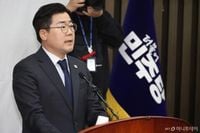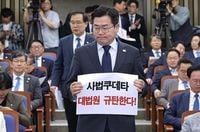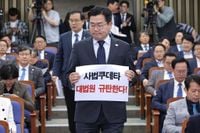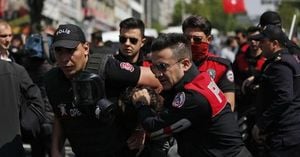On May 1, 2025, Park Chan-dae, the floor leader of the Democratic Party of Korea, openly criticized the Supreme Court's ruling regarding Lee Jae-myung, a prominent presidential candidate, during an emergency general meeting held at the National Assembly in Seoul. The Supreme Court's decision to return Lee's election law case for retrial was met with strong condemnation from Park, who described the ruling as a "rushed decision" that the public would find difficult to accept.
During his remarks, Park emphasized the unusual speed of the court's actions, noting that the case was sent back for review just nine days after being assigned to the full court, with only five deliberations taking place. He stated, "It is impossible to properly review over 60,000 pages of trial records in such a short time." This rapid handling of the case raised eyebrows and led Park to question the integrity of the judicial process.
At 3 PM on the same day, the Supreme Court announced its decision, and just one hour later, Prime Minister Han Duck-soo resigned, which many interpreted as a de facto declaration of his candidacy for the presidency. Park remarked, "This is like a scripted game of Go-Stop, and the public is not blind to these maneuvers." He pointed out the timing of the events as suspicious, suggesting a coordinated effort behind the scenes.
In his critique, Park argued that the Supreme Court's ruling failed to consider the constitutional significance of political expression and election campaigning. He stated, "This ruling disregards the basic principles of criminal procedure law, which dictate that in cases of doubt, the interpretation should favor the defendant." He further accused the court of undermining public trust in the judiciary, labeling the decision as one that would go down in history as a dark chapter in the legal system.
Park's comments were not merely rhetorical; he expressed a belief that the ruling reflected a broader attempt to undermine Lee, who is seen as a leading candidate in the upcoming presidential elections. He asserted, "The court's actions reveal a sinister intent to bind a powerful political figure with shackles, but this coup will ultimately fail. The true sovereign is the people, not the judiciary, and they will decide who their president is."
He also criticized the Supreme Court for not adhering to its own precedent, stating, "This ruling contradicts the latest precedents established by the court itself, demonstrating a lack of consistency and fairness." Park called the court's decision a dangerous precedent that allows for subjective judgments, which could have far-reaching implications for political expression in Korea.
In response to the ruling, opposition parties, including the People’s Power Party and the New Reform Party, began calling for the Democratic Party to replace Lee as its candidate. However, Park firmly rejected these demands, stating, "There will be no change in our candidate. We will respond through constitutional and legislative means if necessary." This stance indicates the Democratic Party's commitment to supporting Lee amidst the political turmoil.
Park's remarks were echoed by other party members during the meeting, who expressed their solidarity and determination to stand by Lee. Many attendees voiced concerns that the ruling could set a dangerous precedent for future political candidates, potentially stifling free speech and campaign activities.
As the political landscape continues to evolve, the implications of the Supreme Court's ruling on Lee Jae-myung's candidacy and the broader electoral process remain to be seen. Park Chan-dae's passionate defense of Lee and criticism of the judiciary reflect deep divisions within the South Korean political sphere, where accusations of judicial overreach and political maneuvering are becoming increasingly common.
The Democratic Party's response to the ruling will likely play a significant role in shaping public perception and influencing the upcoming elections. As the party rallies around Lee, the question remains whether they can effectively counter the narrative set forth by their opponents and maintain public support in the face of such judicial challenges.
In conclusion, the events of May 1, 2025, mark a critical juncture in South Korean politics, as the interplay between the judiciary and political candidates raises important questions about the integrity of the electoral process and the role of the judiciary in shaping political outcomes.






